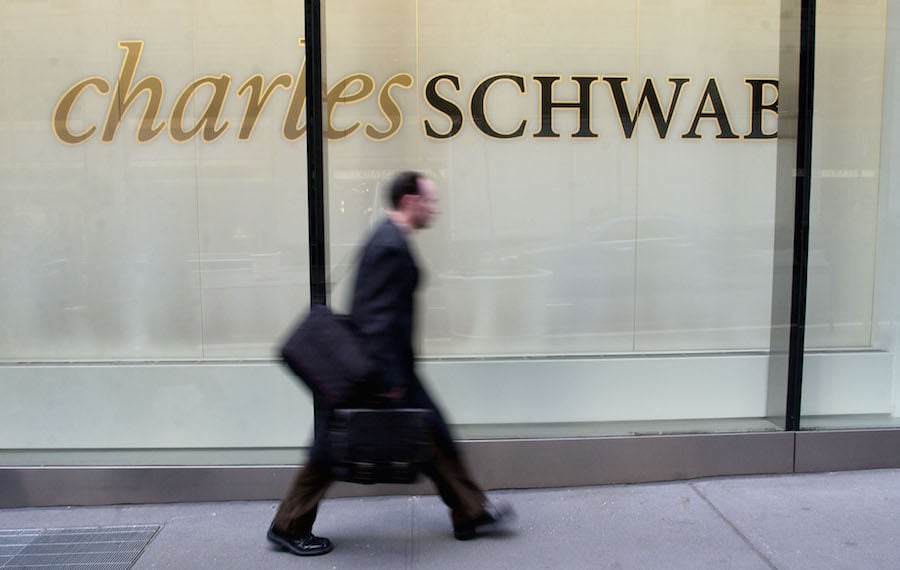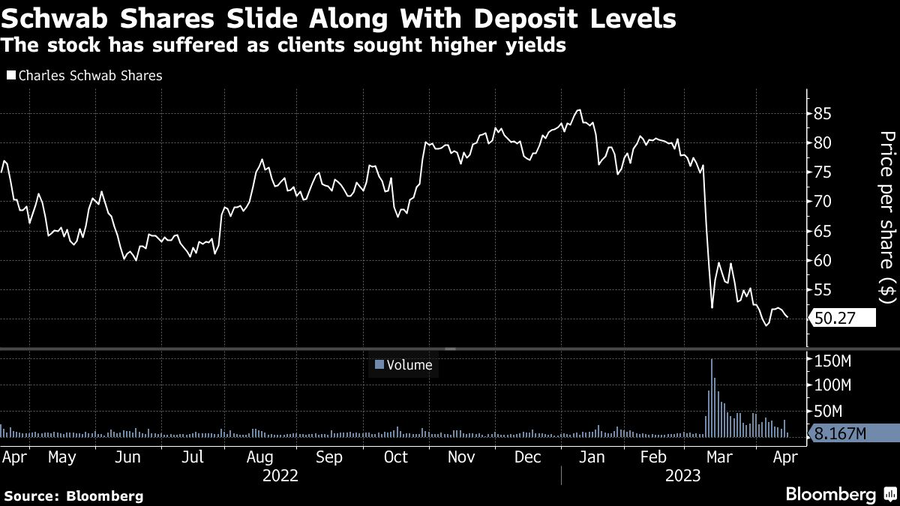

Charles Schwab Corp. shares steadied after the company announced Monday that deposits tumbled 30% during the first quarter, in line with most estimates, and that it’s halting stock buybacks amid the worst U.S. banking turmoil since 2008.
The brokerage rose 23 cents to $51 a share in New York at 9:53 a.m., after a 39% plunge this year through last week. Customer deposits slid to $325.7 billion as of March 31, Schwab said Monday in its first-quarter earnings statement, leaving them down 11% from the start of the year.

The drop roughly matched Wall Street estimates, but investors have been focused on deposit levels because if those decline too much, Schwab could eventually be forced to sell securities at a loss. The company issued statements in recent weeks to reassure investors that there’s a “near-zero” chance of that.
Meanwhile, Schwab bolstered its finances by borrowing $45.6 billion from the Federal Home Loan Bank system — three times more than in the fourth quarter. Such borrowings are sometimes viewed as a sign of financial stress.
“Maintaining the capital and liquidity required to support Schwab’s long-term growth remains our primary balance sheet objective,” chief financial officer Peter Crawford said in the statement. “Ultimately, we believe the current headwinds will prove transitory.”
Customers continued to add money to other Schwab investment products. Core net new assets totaled $132 billion, including $53 billion in March alone, the second-most ever for that month. The Federal Reserve’s rapid interest rate hikes encouraged customers to move funds away from Schwab’s low-yielding accounts, which underpin its revenue, in search of higher-rate options elsewhere.
“Our top priority this quarter was to stay connected to our clients — to help them understand what is happening in the marketplace,” Chief Executive Walt Bettinger said in the statement.
Schwab cited “regulatory uncertainty” for its decision to pause stock buybacks following the collapse last month of three U.S. lenders, including Silicon Valley Bank and Signature Bank.
Adjusted earnings per share were 93 cents, 3 cents more than the average estimate of analysts in a Bloomberg survey. Revenue totaled $5.1 billion, compared with Wall Street’s $5.2 billion estimate.

Blue Anchor Capital Management and Pickett also purchased “highly aggressive and volatile” securities, according to the order.

Reshuffle provides strong indication of where the regulator's priorities now lie.

Goldman Sachs Asset Management report reveals sharpened focus on annuities.

Ahead of Father's Day, InvestmentNews speaks with Andrew Crowell.

Cerulli research finds nearly two-thirds of active retirement plan participants are unadvised, opening a potential engagement opportunity.
Barely a decade old, registered index-linked annuities have quickly surged in popularity, thanks to their unique blend of protection and growth potential—an appealing option for investors looking to chart a steadier course through today’s choppy market waters, says Myles Lambert, Brighthouse Financial.
How intelliflo aims to solve advisors' top tech headaches—without sacrificing the personal touch clients crave
